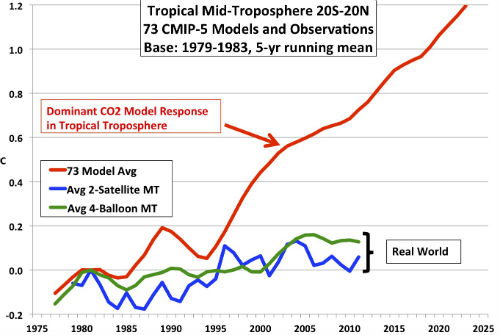In Reason, Ronald Bailey asks whether we can trust the IPCC’s climate models:
On Monday, the U.N.’s Intergovernmental Panel on Climate Change (IPCC) released the final draft of Climate Change 2013: The Physical Sciences Basis. The report’s Summary for Policymakers flatly states: “Warming of the climate system is unequivocal, and since the 1950s, many of the observed changes are unprecedented over decades to millennia. The atmosphere and ocean have warmed, the amounts of snow and ice have diminished, sea level has risen, and the concentrations of greenhouse gases have increased.” Pretty much everyone concerned with this issue agrees that those are the facts. But what is causing the planet to warm up? Here is where it gets interesting.
[…]
The IPCC report acknowledges that almost all of the “historical simulations do not reproduce the observed recent warming hiatus.” Not to worry, it assures us; 15-year pauses just happen, and you can’t really expect the models to simulate these kind of random natural fluctuations in the climate. Once this little slow-down passes, “It is more likely than not that internal climate variability in the near-term will enhance and not counteract the surface warming expected to arise from the increasing anthropogenic forcing.” In other words, when the warm-up resumes it will soar.
John Christy, a climatologist at the University of Alabama in Huntsville, has come to a different conclusion. Christy compared the outputs of 73 climate models for the tropical troposphere used by the IPCC in its latest report with satellite and weather balloon temperature trends since 1979 until 2030. “The tropics is so important because that is where models show the clearest and most distinct signal of greenhouse warming — so that is where the comparison should be made (rather than say for temperatures in North Dakota),” Christy explains in an email. “Plus, the key cloud and water vapor feedback processes occur in the tropics.” When it comes to simulating the atmospheric temperature trends of the past 35 years, Christy found, all of the IPCC models are running hotter than the actual climate.
[…]
To defend himself against any accusations of cherry-picking his data, Christy notes that his “comparisons start in 1979, so these are 35-year time series comparisons” — rather longer than the 15-year periods whose importance the IPCC disputes.
Why the discrepancy between the IPCC and Christy results? As Georgia Tech climatologist Judith Curry notes, data don’t speak for themselves; researchers have to put them into a context. And your choice of context — say, the year you choose to begin with — can influence your conclusions considerably. While there may be nothing technically wrong with the way the IPCC chose to display the comparison between model data and observation data, “Curry observes, it will mislead the public to infer that climate models are better than we thought.” She adds, “What is wrong is the failure of the IPCC to note the failure of nearly all climate model simulations to reproduce a pause of 15+ years.”




